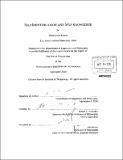Self-identification and self-knowledge
Author(s)
Kwon, Hongwoo
DownloadFull printable version (6.627Mb)
Other Contributors
Massachusetts Institute of Technology. Dept. of Linguistics and Philosophy.
Advisor
Robert C. Stalnaker.
Terms of use
Metadata
Show full item recordAbstract
The traditional view has it that self-locating beliefs are distinctive in that they have distinctive contents. Against this, I claim that the distinctive element of self-locating beliefs should be placed outside contents. If someone believes that he himself is hungry, he not only has a propositional belief of a certain particular person that he is hungry, but also identifies himself as that particular person. The latter is not a matter of propositional belief, but a matter of taking a first personal perspective on that person's actions, beliefs and experiences. A subject takes his actions and beliefs to be "up to" himself, and regards his experiences as giving information about where he is located in the world. All these phenomena are shown to be related to the peculiar ways in which we come to know certain facts about ourselves. So self-identification is conceptually connected to self-knowledge. The three chapters discuss some parts or aspects of this reasoning. Chapter 1, "Perry's Problem and Moore's Paradox," claims that Perry's problem of the essential indexical and Moore's paradox are essentially a single problem applied to two different aspects of our rational activities, actions and beliefs, respectively. Chapter 2, "On What the Two Gods Might Not Know," defends what may be called an ability hypothesis about self-locating knowledge, drawing on David Lewis's ability hypothesis about phenomenal knowledge. What the gods might lack is best viewed as the abilities of self-knowledge. Chapter 3, "What Is the First Person Perspective?" asks what it is to take a first person perspective and view oneself as the author of one's own actions. It is a matter of taking a deliberative stance toward one's own actions, which in turn can be best understood as the special ways in which we know them.
Description
Thesis (Ph. D.)--Massachusetts Institute of Technology, Dept. of Linguistics and Philosophy, 2010. "September 2010." Cataloged from PDF version of thesis. Includes bibliographical references (p. 119-122).
Date issued
2010Department
Massachusetts Institute of Technology. Department of Linguistics and PhilosophyPublisher
Massachusetts Institute of Technology
Keywords
Linguistics and Philosophy.